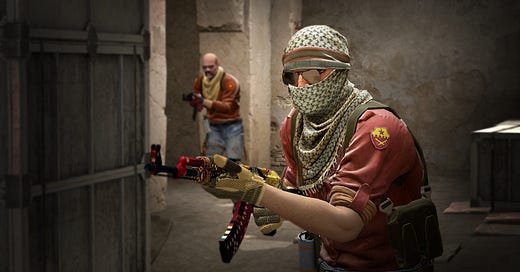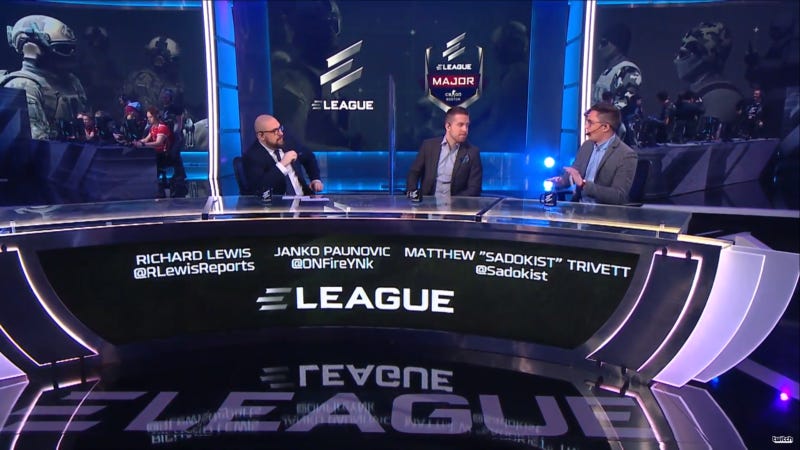Thanks Valve But Also Kinda Fuck You Too
It's cool that you're ready to get involved and make CS2 the greatest game and esport in the world. I just wish you'd had that energy when it came to ten years of CS:GO.
So CS:GO is being “replaced” by Counter-Strike 2, the game whose existence I announced to the world in March. While this is simply the same type of engine update that Dota 2 went through and is one that will put the game in a better position long term, the personalities and players that were prominent in the “Global Offensive” years are feeling collectively maudlin.
The conventional thing to do seems to be to post something celebratory, to express thanks for the opportunities that the game afforded you and the memories you’re left with. Not me. I personally find it odd that anyone would say thanks to an ultra wealthy corporation after years, or in some cases decades, of underpaid, unappreciated work to create a stable ecosystem that they can destroy or exclude you from at any moment. You add value that you will never share in, like the indoctrinated buffoons that hand over billion dollar patent ideas to corporations in exchange for a promotion and an office. And what’s worse when it comes to CS:GO specifically Valve treated it like one big petri dish for the entirety of its existence, an eleven year experiment that was little more than a precursor to whatever CS2 becomes.
Even as jaded I am I’d be hard pushed to say it was a total waste of time. There were a handful of good years, a period of time where I didn’t have to worry about making rent or justifying the career choice to anyone. No, for a few years it actually felt like we’d made it. I got to ride the wave that started far out at sea all the way to view the peak of esports from the perfect vantage point and did it surrounded by loved ones that could all see the same thing I could. But waves break against the shore and roll back and that ride can never be as good the second time even if you believed for a second the surf could ever get as high. No, sadly it was a right time, right place kind of deal like San Francisco in the fifties or Seattle in the nineties… We could have all walked away happy if it was the final destination but instead the entire business was sold out from underneath the people that had steered it ashore by narcissistic attention junkies who wanted bank balances to match their bloated egos.
That’s nothing to do with Valve who are a company I like and admire for the most part. I am on record as saying out of all the game developers I’ve met they are the most approachable. Oh, they still think they’re the smartest people in the room regardless of who is in it… That just comes with the territory when you work in the tech world building digital empires where you wield unlimited power. Still, they at least engage with the serfs from time to time and feedback isn’t impossible. Even if they ignore you they won’t have you decapitated for suggestions unlike Riot Games or Activision-Blizzard. Valve doesn’t run secret blacklists or engage in smears behind the backs of purported colleagues. Valve don’t hijack esports events to host tawdry parties and exploit their influence. Criticising Valve isn’t career suicide for players, journalists or broadcast talent.
Valve’s problem is one of detachment. They are a parent so psychotically mellow they will let the kids play with fire and gasoline because somewhere in the aftermath might be a learning moment. Often, as we’ll get to, it is they themselves that provide the matches. For someone like me who has spent the best part of my adult life trying to put out the resultant fires you will have to forgive me if I don’t say thanks.
First and foremost while it might make for a good TED Talk that Valve essentially invented cryptocurrency/NFTs with the addition of in-game skins in 2013 it also kickstarted an unregulated gambling industry and brought unprecedented levels of corruption into the CS space. The defence of this is generally that they could never have foreseen what it would do to the long term fabric of the scene, that it wasn’t inevitable corruption would come to CS:GO as a result of a few cosmetic items. Of course, those of us old enough to remember when organised crime groups used Team Fortress 2 keys to launder money know they had plenty of red flags to be more cautious. The 322 match fixing scandal in your favourite product, Dota 2, also should have told them that match fixing wasn’t just confined to South Korean Starcraft. Instead you let unscrupulous companies use your technology to raise a generation of gambling addicts and emotional cripples. Their proximity to the professional scene eroded the foundations of integrity in competitive Counter-Strike to a degree the game had never experienced in any of its previous iterations.
At any time Valve could have stopped that. They could have shut down CS:GO Lounge, the worst offender when it came to enabling both unchecked gambling and match fixing. The 2013-2015 era will forever be a stain on the professional game’s legacy and those of us in the know will always have to stomach the fact that because skins were treated so frivolously even players we respect threw matches to acquire them. Valve could have traced every single suspect skins transaction and caught every match-fixer in one fell swoop if they cared to do it. Instead that pile of shit was left for others to clean up, Valve watching from a safe distance while this dumb community heckled anyone willing to pick up a shovel.
It wasn’t just the match-fixing of course. Our game got raided by influencers and Call of Duty clout goblins who scammed kids naive enough to believe their favourite personalities would never steal from them. By the time you did get round to issuing the cease and desists they had all made out like bandits of course… Overnight millionaires and almost untouchable due to legal loopholes, jurisdictional issues and politicians that didn’t know what a skin was. Those of us who had put the game first had to watch as they flexed sports cars and luxury homes knowing the worst they would get was a slap on the wrist.
Let’s shelve all that and then look at the tournament landscape. For years ESL ran every type of dirty trick in the book to fuck over their competition. They even repeatedly tried to fuck over Valve too, deliberately holding secret meetings to create franchise leagues when they knew Valve employees were on their annual holiday to Hawaii. They have oppressively sat on the calendar of CS:GO for years and have used that leverage to get away with murder (the metaphorical kind, not the kind their new owners engage in). Talent too afraid to speak out about late payments because they know 80% of their work could disappear if they do. Teams that qualified to their professional league having their rightfully earned slots ripped away from them and sold to bigger organisations. Myriads of conflict of interest and backroom dealing that make it so certain teams and indeed ESL themselves are completely untouchable no matter what misconduct they engage in. Valve just happily continue to hand over the license to their games even though they know ESL will ultimately weaponise them against the rest of the esports ecosystem.
Now they’re owned by the Saudi Arabian state and their antics can be emboldened by the knowledge they can never run out of money. Many if not most of their events will be repurposed with a view to them being held in Riyadh and later NEOM as part of an ongoing strategy to paper over the cracks of their human rights abuses and placate their citizenry. Take away their license to Valve intellectual property and suddenly a more ethical tournament operator is holding the cards for CS:GO.
But I get it, Valve obviously doesn’t want to make any decision that could be interpreted as a geopolitical statement. That much was clear when they allowed the Chinese government to ban a player from competing in one of their tournaments on the basis if he attended they couldn’t “guarantee his safety.” At least Valve don’t get sanctimonious about these types of decisions like the rest of the North American development companies who sermonise publicly about how their customers need to be better people before grabbing lunch with the planets worst human rights violators.
What I don’t get is how Valve could turn a blind eye to the inherent problems of partnered leagues. This is being addressed for 2025, conveniently when the existing agreements expire, but what it has done to competitive Counter-Strike in the mean time has brought us to the point where an entire year’s worth of competition is utterly meaningless in a broader context. Creating a tiered system of haves and have-nots, while very much the American way, is antithetical to esports original vision. The need for “franchising” is bullshit peddled by the VC funded groups who need to justify lavish spending by having an asset they can sell. It doesn’t work in a space where theoretically anyone can create an organisation tomorrow or accidentally find the best player in the world on a pub server. Good teams were excluded from an almost entire calendar of competition because they didn’t happen to have $5 million lying around on the day the tournament operators decided to make competitors underwrite their broken business models. In place of the hungry we had to watch trash like Evil Geniuses go through the motions of meeting their contractual obligations before getting back to playing Valorant. Again, all of this was preventable and Valve now clearly acknowledge it was a problem but it’s too late now to save the final years of the CS:GO legacy.
Many people have been effectively penalised for talking about these and the myriad other issues in the space. They’ve been blacklisted, threatened and treated like pariahs for trying to tame this part of the esports frontier. In return for that service they were cut out of something they love, something that hurts a lot more than watching your bank balance shrink month after month. I imagine those people don’t feel very thankful. Still, I’m sure it’ll make for a riveting series of anecdotes at your next developer convention in future.
For now though we’re here in the present and it is easy to see the change in Valve… A few busts when it comes to games have made them want to show their customers that they still can do the things that put the company on the map. The endless passive revenue stream from their online store gives them the financial freedom to channel their energy and time wherever they wish and right now it’s into the games. There now seems to be a genuine interest in the health of the esports side of the game for the first time in a while. That bodes well for CS2 and if the things I’m hearing behind the scenes are accurate then I’m confident the game will live up to its promise. I’m glad you got your data points and learned some lessons so you can do things differently but for those of us that wanted CS:GO to be better than it turned out, especially those of us who don’t have it in us for another go-around with a new esports title, the newfound commitment will always feel like a slap in a face.








An absolute banger article
Too little too late. Most of people who brought value to the scene are gone.